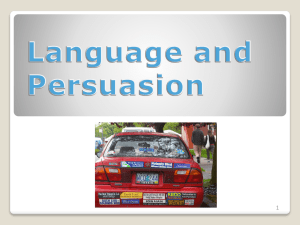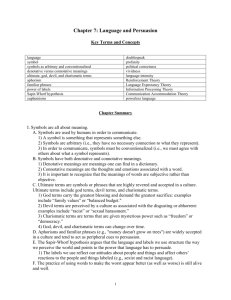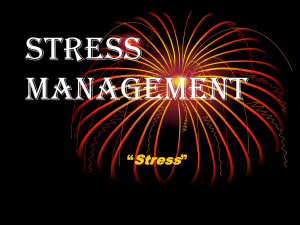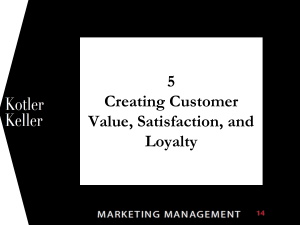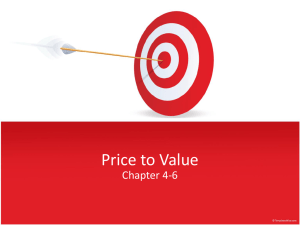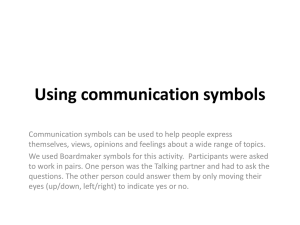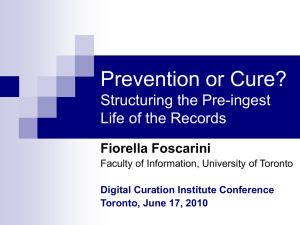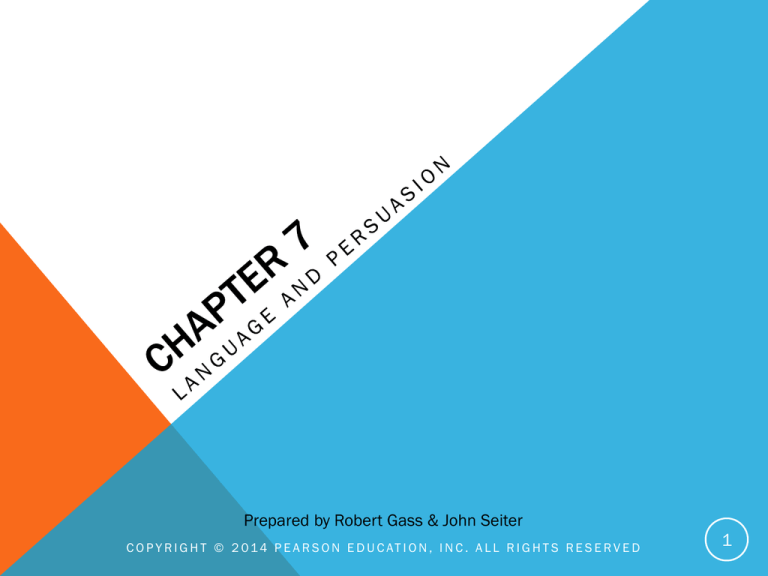
Prepared by Robert Gass & John Seiter
C O P Y R I G H T © 2 01 4 P E A R S O N E D U C AT I O N , I N C . A L L R I G H T S R E S E R V E D
1
WORDS HAVE POWER
Children’s names carry connotations
Words affect perceptions, attitudes, beliefs, and emotions
undocumented person vs. illegal immigrant
person of color versus Black person, African-American,
Negro, N-word
C O P Y R I G H T © 2 01 4 P E A R S O N E D U C AT I O N , I N C . A L L R I G H T S R E S E R V E D
2
SYMBOLS
Symbols are arbitrary words, images, or behavior that
stand for or represent something else.
Symbols are arbitrary: The word for “pig” could just as easily
be “garp”
Symbols include images (peace sign, thumbs up gesture)
Symbols can include behavior (rituals and rites or other
symbolic action)
C O P Y R I G H T © 2 01 4 P E A R S O N E D U C AT I O N , I N C . A L L R I G H T S R E S E R V E D
3
SYMBOLS, MEANING, AND PERSUASION
Denotative meaning
Connotative meaning
A word’s strict dictionary
definition
Emotional associations surrounding
a word
Animals names
Alligator
Bison
Elephant
Leopard
References to females/males using
animal names
Bitch
Fox
Chick
Pig
Cougar Stud
Cow
Tiger
Dog
Wolf
Moose
Python
Rooster
Zebra
C O P Y R I G H T © 2 01 4 P E A R S O N E D U C AT I O N , I N C . A L L R I G H T S R E S E R V E D
4
ULTIMATE TERMS
God terms
family values, peace, truth, modern
Devil terms
deadbeat dad, sexual predator, sweatshop, hate crime
Charismatic terms
green, natural, freedom, democracy
Terms may change, evolve over time
political correctness, affirmative action, liberal
C O P Y R I G H T © 2 01 4 P E A R S O N E D U C AT I O N , I N C . A L L R I G H T S R E S E R V E D
5
APHORISMS, FAMILIAR PHRASES
Famous sayings, proverbs, and
folk wisdom can facilitate
persuasion
Such truisms function as
peripheral cues
“Rome wasn’t built in a day”
“Don’t put all your eggs in one
basket”
“Money doesn’t grow on trees”
Students heard a persuasive
message that included familiar
phrases
Some students were
distracted while listening
Some students were not
The distracted students were
more persuaded than the ones
who paid full attention
(Howard, 1997)
C O P Y R I G H T © 2 01 4 P E A R S O N E D U C AT I O N , I N C . A L L R I G H T S R E S E R V E D
6
THE POWER OF LABELING
People’s names influence
impressions
Perceived likeability, friendliness
Perceptions of their “hotness”
Labels reflect attitudes
male, guy, dude
female, girl, chick, broad
gay, queer, fag, homosexual
Food servers who used patrons’
names received higher tips
Job titles
Barista at Starbucks
“Genius bar” at Apple
stores
Geek Squad at Best Buy
C O P Y R I G H T © 2 01 4 P E A R S O N E D U C AT I O N , I N C . A L L R I G H T S R E S E R V E D
7
THE POWER OF LABELING
Prescription drug names
branding companies typically earn
between $50,000 and $250,000
for coming up with a unique name
for a prescription drug
Names that sound scientific,
with an “X” or “Z” are popular
Paxil
Prozac
Zoloft
Xanax
Lexapro
Nexium
C O P Y R I G H T © 2 01 4 P E A R S O N E D U C AT I O N , I N C . A L L R I G H T S R E S E R V E D
8
SAPIR-WHORF HYPOTHESIS
Language shapes the way we
think
The average Joe or Jill might call a
color “off-white”
Language can facilitate or inhibit
certain types of thinking
A painter or clothing designer might
differentiate between subtle shades
More precise language enables
more focused thought
Texting versus writing
Texting is fast, generic
Writing is slow, nuanced
•
•
•
•
•
•
•
•
alabaster
antique white
bone
China
cream
eggshell
ivory
parchment
9
C O P Y R I G H T © 2 01 4 P E A R S O N E D U C AT I O N , I N C . A L L R I G H T S R E S E R V E D
THE POWER OF RENAMING
“progressive” versus “liberal”
“death panels” versus “health insurance”
“troop reduction” versus “cut and run”
“peer-to-peer file sharing” versus “internet piracy”
“pre-owned” versus “used”
“womyn” instead of “women”
C O P Y R I G H T © 2 01 4 P E A R S O N E D U C AT I O N , I N C . A L L R I G H T S R E S E R V E D
10
EUPHEMISMS & DOUBLE-SPEAK
It sounds so much better when you put it that way.
commercial sex worker vs. prostitute or whore
enhanced interrogation techniques vs. torture
faith-based vs. religious
downsizing, right-sizing, or bright-sizing vs. being fired
hobo or homeless vs. vagabond or sojourner
Euphemisms can help people save face
“I’m between jobs right now”
Euphemisms can convey tact, sensitivity
“I need to visit the men’s room”
C O P Y R I G H T © 2 01 4 P E A R S O N E D U C AT I O N , I N C . A L L R I G H T S R E S E R V E D
11
LANGUAGE INTENSITY, VIVIDNESS, AND OFFENSIVENESS
Profanity is rarely a persuader’s friend.
Profanity tends to lower perceived credibility
Perceptions of profanity are topic, audience, and
situation specific
Religious profanity was perceived less negatively
than sexual profanity, with excretory profanity
perceived somewhere in between
C O P Y R I G H T © 2 01 4 P E A R S O N E D U C AT I O N , I N C . A L L R I G H T S R E S E R V E D
12
POLITICAL CORRECTNESS
Evolving terms for AfricanAmericans
N-word
Darkie
Colored
Negro
Black
African-American
Person of color
Bi-racial, multi-racial
The control of language entails the
control of social reality
terrorist vs. martyr vs. freedom fighter
The power of naming shapes
perceptions and confers power
The gay community has taken back
the word “queer” and made it socially
acceptable
C O P Y R I G H T © 2 01 4 P E A R S O N E D U C AT I O N , I N C . A L L R I G H T S R E S E R V E D
13
POLITICAL CORRECTNESS
The language of disability
Saying “wheel chair bound” emphasizes the disability first
Saying “person with a disability,” (PWD) emphasizes the
person first
Persuaders who used empowering terms (heroic) for PWDs
were perceived as more credible
Persuaders who used pejorative terms (pathetic) were
perceived as less credible
C O P Y R I G H T © 2 01 4 P E A R S O N E D U C AT I O N , I N C . A L L R I G H T S R E S E R V E D
14
VIVIDNESS
Vivid language is more memorable than pallid
language
Colorful, picturesque language increases
attention and retention
Pallid language is, well, boring
Vivid language must be congruent with the
message
C O P Y R I G H T © 2 01 4 P E A R S O N E D U C AT I O N , I N C . A L L R I G H T S R E S E R V E D
15
LANGUAGE INTENSITY
Intense language demonstrates
a source’s bias on a topic or
issue
National health insurance will
lead to “death panels” (Sarah
Palin)
“Humans have no more value
than slugs” (John Daley, editor
of Earth First!)
People who aren’t shifting to
bio-diesel fuel are “raping the
planet” (Fuel: Uncovering
America’s Dirty Little Secret,
2008 documentary)
Reinforcement Theory
Intense language facilitates
persuasion with a friendly audience
Intense language can alienate a
hostile audience
Language Expectancy Theory
Violations perceived positively
facilitate persuasion
Violations perceived negatively
inhibit persuasion
How a violation is perceived
depends on the status and reward
power of the violator
C O P Y R I G H T © 2 01 4 P E A R S O N E D U C AT I O N , I N C . A L L R I G H T S R E S E R V E D
16
LANGUAGE INTENSITY
Information Processing Theory
Intense language persuades
via message discrepancy
A previously unthinkable
position becomes more
thinkable
Intense language may also
backfire based on the contrast
effect
Communication Accommodation
Theory
Persuaders who match the
language style of their audience
are more effective
Intense language users prefer
intense speakers
Non-intense language users
prefer non-intense speakers
C O P Y R I G H T © 2 01 4 P E A R S O N E D U C AT I O N , I N C . A L L R I G H T S R E S E R V E D
17
POWERFUL VS. POWERLESS LANGUAGE
Powerful, assertive language is
generally more persuasive
“I have an important
question…”
Powerful language conveys confidence,
credibility
But…
“I loved that movie.”
Powerful language requires good
arguments and evidence
“Let’s grab some coffee and
talk.”
Females may need to moderate their
assertiveness for male audiences
“My skill set is a perfect fit for
your company.”
C O P Y R I G H T © 2 01 4 P E A R S O N E D U C AT I O N , I N C . A L L R I G H T S R E S E R V E D
18
POWERLESS LANGUAGE
Powerless language signifies low
status, low credibility
This may sound like a dumb
question but…”
“That was a good movie, don’t
you think?”
“I was kind of hoping that maybe
we could get together for coffee
sometime, if you want.”
“Uh, so I would, really, um, like
to work here, um, at, like, your
company.”
*Note: Some types of diplomatic language are
polite, but not powerless
Types of powerless language
Disclaimers
You’ll probably say ‘No’ but…”
Hedges
“kind of,” “sort of,” “I guess”
Hesitations
“uh,” “um,” “like,” “you know”
Intensifiers
“Very,” “really,”
Polite forms*
“If it’s okay…” “I’d appreciate it if…”
Tag questions
“don’t you think?”
C O P Y R I G H T © 2 01 4 P E A R S O N E D U C AT I O N , I N C . A L L R I G H T S R E S E R V E D
19

